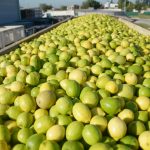Endosulfan and the Southern Hemisphere fruit industry
Endosulfan is already out of use in many Southern Hemisphere agricultural economies, but a recent ban of the pesticide from the United Nations' Stockholm Convention has helped cement its removal from the food chain. More than 120 countries, including major producer India, agreed to a phase-out of Endosulfan by 2012, with some exceptions applying until 2017. 
Linked to cancer and birth defects, Endosulfan has been used in farms internationally with damaging consequences for both agricultural workers and consumers. The chemical's main producers are India, China, South Korea, Brazil and Israel according to Physorg.com, but there will be very little demand for the product next year provided the Stockholm signatories hold up their end of the bargain.
There are still countries, however, who are not signatories to the convention such as Russia, Italy, Malaysia, Zimbabwe, Saudi Arabia and the U.S., but the latter has still agreed to phase out the product by 2016.
In Australasia, New Zealand banned the substance two years ago and Australia already had its own phase-out plan in place for the chemical's removal by 2012. In Latin America, at www.freshfruitportal.com we speak to experts from Chile and Argentina about what the recent move will mean for the fruit industry.
Chile-based Andes Control SA boss Juan Luis Castillo says Endosulfan emerged in the 1950's to combat a wide variety of insects and mites that affected the agricultural sectors.
"It's scope is recommended for a wide range of crops such as grapes, peaches, nectarines, plums, cherries, avocadoes, apricots, pears, apples, raps, tobacco, artichokes, tomatoes, capsicums, garlic, cucumbers, peas, beans, lentils, corn, potatoes, clover and alfalfa, among others," he says.
"In the past two decades many countries have recognized the dangers of extensive use of this pesticide and have stopped producing, and/or have banned or restricted its use. Currently, its use is banned in over 50 countries including the European community and some countries in Asia. It also has restricted use in various countries, as is the case in the United States.
"With respect to Chile, although its use is permitted - it's marketed under the names Thionex, Endocil, Phase and Benzoepin - it's practically out of use...other products have arisen that are capable of combating the same pests at a lower cost and a lower risk of default on health requirements in destination markets."
He highlights US-based EPA's (Environmental Protection Agency) recommendations that manufacturers of Endosulfan cancel production due to its 'high acute toxicity'.
"Acute poisoning from Endosulfan can cause hyperactivity, tremors, convulsions, a lack of coordination, breathing difficulties, nausea, vomiting, diarrhea, and in severe cases, unconsciousness.
"Agricultural workers with chronic exposure to Endosulfan are at risk of rashes and skin irritation."
Like Chile, Argentina too is a signatory to the Stockholm Convention but until the total ban is enforced companies will technically still be able to use the product on a wide range of crops, including almonds, cherries, plums, peaches, apricots, strawberries, pears, citrus fruit, watermelon, tomatoes, melons and peanuts.
The country's National Food Quality and Safety Service (SENASA) is not able to provide information on the extent of endosulfan use in Argentina, but points to a resolution that allows public participation to draft standards for the use of chemcials.
"The National Register of Plant Therapy has registered other insecticides of other chemical groups which can cover the spectrum of Endosulfan's actions. It is necessary to bear in mind that in each case you have to analyze the particular crop and the pest you want to, control, as well as health plans," SENASA told www.freshfruitportal.com in a statement.
Photo: www.horadigital.com.ar














































